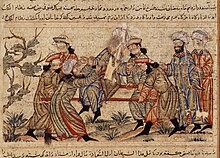Nizaris
Appearance
Nizaris, also called Batinis, Hashshashins, or Assassins, were a group of Ismailis that were seeking to establish a new order in the 11th-12th century.
Quotes
[edit]

- They call him "Shaykh-al-Hashishim". He is their Elder, and upon his command all of the men of the mountain come out or go in ... they are believers of the word of their elder and everyone everywhere fears them, because they even kill kings.

- [They] were accustomed to kill people secretively. Some people approached him [the nobleman Orghan] while he was walking on the street … When he stopped and wanted to inquire … they jumped upon him from here and there, and with the sword which they had concealed, stabbed and killed him … They killed many people and fled through the city … They encroached upon the fortified places … as well as the forests of Lebanon, taking their blood-price from their prince … They went many times wherever their prince sent them being frequently in various disguises until they found the appropriate moment to strike and then to kill whomever they wanted. Therefore all the princes and kings feared them and paid tax to them.
- Kirakos Gandzaketsi (c. 1200/1202–1271)
- Quoted by Dashdondog, Bayarsaikhan (2010). The Mongols and the Armenians (1220-1335). BRILL. pp. 125–126. ISBN 978-90-04-18635-4.
- For Brocardus, the Assassins are hired, secret murderers, of a peculiarly skillful and dangerous kind. Though naming them among the hazards of the East, he does not explicitly connect them with any particular place, sect, or nation, nor ascribe any religious beliefs or political purposes to them. They are simply ruthless and competent killers, and must be guarded against as such. Indeed, by the thirteenth century, the word Assassin, in variant forms, had already passed into European usage in this general sense of hired professional murderer.
- Bernard Lewis (1967), "The Discovery of the Assassins", in The Assassins: A Radical Sect in Islam, ISBN 9780297863335
- The emergence of the new monarchies, in which one man could determine the politics and religion of the state, made assassination an effective as well as an acceptable weapon.
- Bernard Lewis (1967), "The Discovery of the Assassins", in The Assassins: A Radical Sect in Islam, ISBN 9780297863335
- Hammer compares the Assassins with the Templars, the Jesuits, the Illuminati, the Freemasons, and the regicides of the French National Convention. `As in the west, revolutionary societies arose from the bosom of the Freemasons, so in the east, did the Assassins spring from the Ismailites ... The insanity of the enlighteners, who thought that by mere preaching, they could emancipate nations from the protecting care of princes, and the leading-strings of practical religion, has shown itself in the most terrible manner by the effects of the French revolution, as it did in Asia, in the reign of Hassan II.
- Bernard Lewis (1967), "The Discovery of the Assassins", in The Assassins: A Radical Sect in Islam, ISBN 9780297863335
- ... the progress of Ismaili studies has been rapid and remarkable ... The resulting picture of the Assassins differs radically both from the lurid rumours and fantasies brought back from the East by mediaeval travellers, and from the hostile and distorted image extracted by nineteenth-century orientalists from the manuscript writings of orthodox Muslim theologians and historians, whose main concern was to refute and condemn, not to understand or explain. The Assassins no longer appear as a gang of drugged dupes led by scheming impostors, as a conspiracy of nihilistic terrorists, or as a syndicate of professional murderers. They are no less interesting for that.
- Bernard Lewis (1967), "The Discovery of the Assassins", in The Assassins: A Radical Sect in Islam, ISBN 9780297863335


